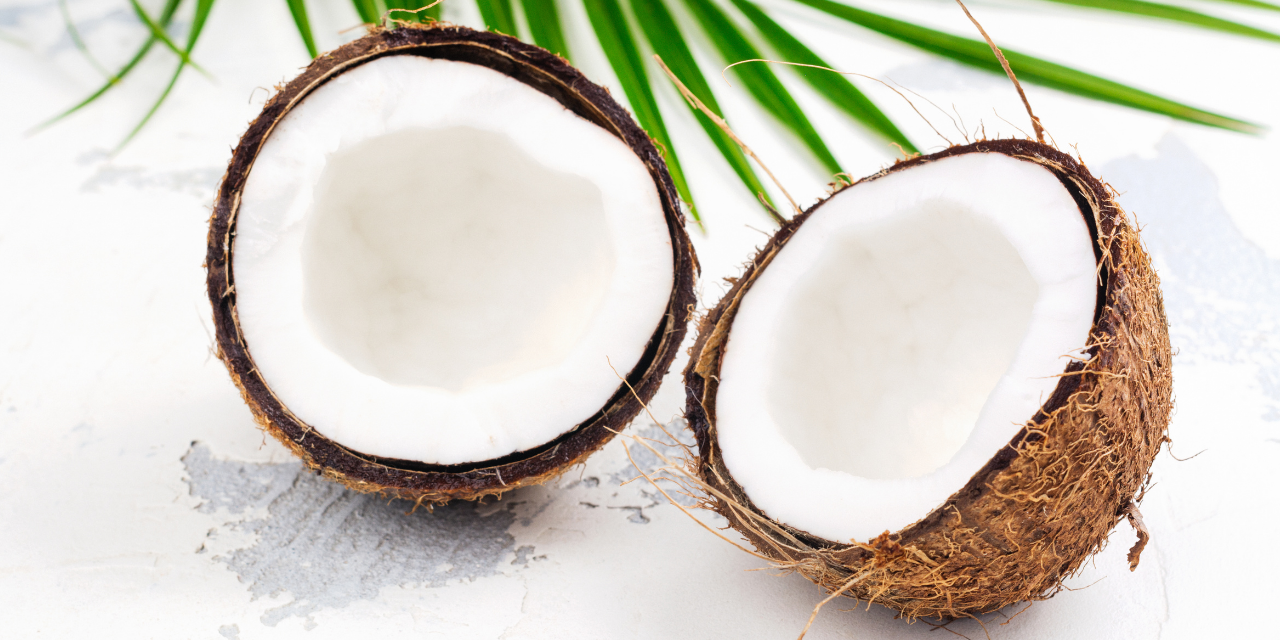
Coconut: Is part of the coconut a superfood?

Spending a few days at the beach last weekend, I noticed all the coconuts ripening on the palm trees, and I thought about how amazing this particular fruit is for our health. I know it is a common staple in my house. In history and in many cultures, the coconut has been used to make baskets, has provided great quality hydration, and even produced charcoal from its outer shell. Today we find it on our supplement shelves as well.
Coconut Oil
Coconut oil is high in fatty acids that contain medium-chain triglycerides (MCTs). Even though it is high in saturated fat, it is the MCTs that metabolize differently than long-chain fatty acids (LCTs). MCTs go straight to the liver and then get converted to be used as energy or into ketones. This allows a faster burn rate and raises the metabolic rate. Interestingly, I have been recommending ketones for years in my clinical practice for those who have suffered a concussion or other traumatic brain injury, and ketones are now being studied used for other conditions, such as epilepsy, dementia and Alzheimer’s disease.
MCTs have a tendency to absorb much faster than other fats. When dealing with concussion, a ketogenic diet helps to provide energy. There has also been some correlation between ketones and help with memory problems associated with both the injury as well as neurodegenerative diseases.
Benefits of Coconut Oil
One major study found that MCTs improved learning, memory, and brain processing in people with mild to moderate Alzheimer’s disease. (1) Sometimes this can even improve mood. In 2018 a study published in Plos One, MCTs were also demonstrated to support exercise performance. Consuming food containing MCTs instead of LCTs for 2 weeks allowed recreational athletes to endure longer bouts of high-intensity exercise. (2) Many of my track athlete patients use MCTs prior to an event to help them with fueling for quick physical exertion and the rapid rate it converts to cellular energy. Post-event, it can aid in the recovery phase to rebuild muscles and prevent the breakdown of protein.
Contained in the flesh of the coconut are necessary minerals: iron, magnesium and potassium. Coconut oil itself contains iron and zinc, as well as a bit of vitamin E and K. Comprised of lauric acid, capric acid, acrylic acid and caproic acid, the benefits increase when incorporating more aspects. The oil also contains plant sterols that mimic blood cholesterol and may help to block cholesterol absorption. They key to most of the health claims are a result of the level of MCTs found in the coconut fruit.
For over 20 years in clinical practice, in addition to MCT oil, I have prescribed products containing lauric acid, which when digested, forms a substance called monolaurin. Patients very successfully have been able to kill bacteria, (primarily staph and step species) fungus, and viruses utilizing such supplements. Candida, a very common yeast found in the gut, as well as systemically, can also be eradicated utilizing lauric acid. I have even used it orally and topically to fight inflammatory acne caused by bacteria. The anti-viral effect may occur because the medium-chain fatty acids disrupt virus membranes, thus preventing them from growing. The caprylic acid is what helps target the fungus.
Because MCTs are easily absorbed and digested and provide an incredible energy source, they can be and have been used for malnutrition and nutrient absorption disorders, such as chronic diarrhea, steatorrhea liver disease, and pancreatic disfunction.
Another common use clinically in my office has been for weight loss. Medium chain triglycerides that can be isolated from coconut can potentially reduce hunger, while helping the body metabolize fat. Studies, although small, have shown that those that consume more MCTs ate fewer calories per day. (3). Think of MCTs as a fast-burning fat rather than one that we typically store. In addition, for those who hold on to large amounts of abdominal fat, there has been evidence to show a reduction body mass index and waist circumference with the intake of just 2 table spoons of coconut oil a day over 12 weeks. (4)
In the Journal of Obesity and Related Metabolic Disorders, a published study in 2003 demonstrated how MCTs had a more significant effect on energy expenditure, body composition, and fat oxidation in obese women, compared to fats with the long-chain triglycerides. It also showed to be better for the prevention of long-term weight gain. The MCTs are believed to suppress fat deposition through enhanced thermogenesis and fat oxidation. The production of the ketones may give the benefits of a keto diet without cutting out massive amounts of carbs.
Coconut Oil for Weight Loss
Other published reasons that MCTs are useful in weight loss have to do with the lower energy density they provide: 10% fewer calories than LCTs, they help satiate and create fullness by raising leptin levels and may help the body burn fat more efficiently, especially at the onset of the desired weight loss. While there are studies to support this, some show no benefit, as we see often in nutrition. Given the lack of a strong correlation for a negative or harmful result, if used properly the worst-case scenario is that the weight loss effects are very minimal.
Digestive concerns face many of our patients. MCT oil may be a great supplement to consider if they have trouble digesting other fats. For those with pancreatic issues, small bowel resection or disease, as well as a short bowel, the MCTs will be much gentler on the digestive system. This is because medium chain fatty acids are less efficiently stored than others, and they are prone to oxidative metabolism upon ingestion. The theory is that because they have a short half-life in the body, they are unlikely to promote obesity via direct storage in adipocytes. (5) There have been reported studies that MCFAs are also less likely to induce insulin resistance that so many of our patients experience. MCTs may also decrease blood sugar levels. In one study, diets rich in MCTs increased insulin sensitivity in adults with type 2 diabetes. (6)
Medium-chain triglycerides can have many potential health benefits. Considering this addition to your supplement recommendations will be a fantastic benefit for your patients. When dosing, there is no perfect number. In studies, anywhere from 1-5 tablespoons or 15-74 mL daily have been ingested. There is no defined tolerable upper intake level; however, a maximum daily dose of 4-7 tablespoons or 60-100mL is suggested, according to Carol Rees Parrish, M.S., R.D., Series Editor, Nutrition Issues in Gastroenterology, series #160, February 2017.
Adverse Affects
There are currently no reported adverse interactions with medications or other potentially serious side effects. Because the reported dosage rage is wide, I always recommend starting slowly and titrating up, especially if a patient is prone to loose bowels, as the laxative effect can be strong if too much is ingested. One teaspoon of the oil is a perfect starting point. Using the MCT in your diet is an easy way to include them. Drizzling it on veggies or making salad dressings with the oil is a simple way to start, in addition to just taking a tablespoon or two.
Nonetheless, be cautious when dosing, since there is the potential for nausea, bloating, gas, vomiting, and an unsettled stomach if ingesting too much. The main drawback with standard MCTs as a cooking oil is that it has a low smoke point. Using laurate-rich MCTs has the advantage that they can be expected to have a somewhat higher smoke point, and, therefore, can be used for pan frying and sautéing, which are the best choices if cooking. Laurate-rich MCTs are closer in structure to coconut oil. When using laureate-rich MCTs or straight coconut oil, there are fewer, if any, reports of patient GI intolerance.
It would also be a good idea to monitor and watch the potential change in cholesterol levels. There are benefits in a cardiovascular arena as well. (7) We have seen a reduction in the ratio of total cholesterol to LDL on blood labs after implementing regular consumption of MCT oil.
Because MCTs have no strong taste or smell, using in a salad dressing, over veggies, or even plain off a teaspoon, is very well tolerated. Using even just coconut oil can also be a good staple for your diet when not trying to reach therapeutic effects with straight MCT oil. Of course, I recommend using good manufacturing sources that adhere to high standards.
References:
1. Sharma A, Bemis M, Desilets AR. Role of Medium Chain Triglycerides (Axona®) in the Treatment of Mild to Moderate Alzheimer’s Disease. Am J Alzheimers Dis Other Demen. 2014 Aug;29(5):409-14. doi: 10.1177/1533317513518650. Epub 2014 Jan 9. PMID: 24413538.)
2. Nosaka N, Suzuki Y, Nagatoishi A, Kasai M, Wu J, Taguchi M. Effect of ingestion of medium-chain triacylglycerols on moderate- and high-intensity exercise in recreational athletes. J Nutr Sci Vitaminol (Tokyo). 2009 Apr;55(2):120-5. doi: 10.3177/jnsv.55.120. PMID: 19436137.
3. Stubbs RJ, Harbron CG. Covert manipulation of the ratio of medium- to long-chain triglycerides in isoenergetically dense diets: effect on food intake in ad libitum feeding men. Int J Obes Relat Metab Disord. 1996 May;20(5):435-44. PMID: 8696422
4.Assunção ML, Ferreira HS, dos Santos AF, Cabral CR Jr, Florêncio TM. Effects of dietary coconut oil on the biochemical and anthropometric profiles of women presenting abdominal obesity. Lipids. 2009 Jul;44(7):593-601. doi: 10.1007/s11745-009-3306-6. Epub 2009 May 13. PMID: 19437058.
5. Bach AC, Ingenbleek Y, Frey A. The usefulness of dietary medium-chain triglycerides in body weight control: fact or fancy? J Lipid Res 1996;37:708–26).
6. RH, Hanson AS, Chen AY, Berman JN, Yost TJ, Brass EP. Dietary substitution of medium-chain triglycerides improves insulin-mediated glucose metabolism in NIDDM subjects. Diabetes. 1992 May;41(5):641-7. PMID: 1568535.
7. Cater NB, Heller HJ, Denke MA. Comparison of the effects of medium-chain triacylglycerols, palm oil, and high oleic acid sunflower oil on plasma triacylglycerol fatty acids and lipid and lipoprotein concentrations in humans. Am J Clin Nutr. 1997 Jan;65(1):41-5. doi: 10.1093/ajcn/65.1.41. PMID: 8988911.

















